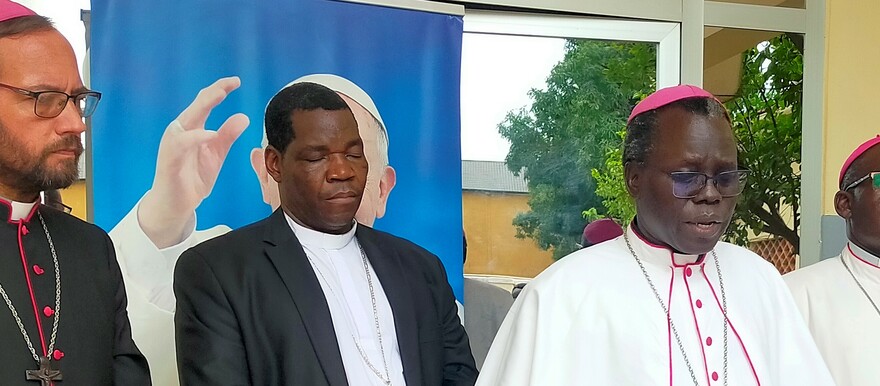The Bishops of the Catholic Church in South Sudan have voiced serious concerns on Friday regarding the ongoing conflict in Sudan, highlighting the alarming rate of killings and human rights violations that have taken place since the outbreak of hostilities in mid-April.
Speaking at a press conference held at the Catholics Bishops Secretariat in Juba, Metropolitan Archbishop Stephen Ameyu Martin Mulla emphasized the devastating impact of the conflict, which has resulted in numerous civilian casualties, instances of rape, and widespread destruction of property. Additionally, the dire humanitarian situation faced by civilians has been exacerbated by the destruction of hospitals, water sources, food supplies, and electricity infrastructure.
“We are deeply troubled by the situation in Sudan as a consequence of this war. Numerous human rights violations, including killings, looting, rape, and the destruction of vital services, have occurred. The people of Sudan have been severely affected,” stated Archbishop Ameyu.
The Archbishop also expressed solidarity with church leaders who remain trapped in Sudan due to the ongoing conflict. “As a church, we stand in solidarity with our fellow Bishops, particularly His Grace Michael Didi of the Archdiocese of Khartoum, His Grace the Nuncio Migel Louis, the Vatican Ambassador in Sudan, Bishop Tombe Trille of El Obeid, Bishop Daniel Adwok, and his eminence Cardinal Gabriel Zuber Wako, all of whom have been affected by this crisis. Furthermore, we extend our support to our faithful in Sudan,” added Bishop Ameyu.
The Prelate urged the international community to exert pressure on the conflicting parties in Sudan to cease the violence and work towards peace. “In light of this setback in Sudan, we must pray for peace and stability in the country. We also implore the international community to apply pressure on the warring factions to bring about peace for the people of Sudan,” urged Bishop Ameyu.
Regarding the situation in South Sudan, Bishop Ameyu called upon the government to address the tribal and inter-communal conflicts within the country, cautioning that these conflicts could potentially escalate into a full-blown war.
“We are mindful of the simmering conflicts in various parts of South Sudan, which could easily escalate into a larger conflict. We should not dismiss these conflicts as merely local or communal, as their origins can be traced back to Juba itself,” stated Bishop Ameyu. “As South Sudanese Bishops, we recommend that the government invest efforts in resolving these internal conflicts within the communities across the country.”
Bishop Ameyu acknowledged that the power-sharing agreement between the parties involved in the South Sudan conflict has brought about relative peace, but noted a sluggish pace in implementing the peace agreement. He expressed concern that conflicts in neighbouring countries, such as the Democratic Republic of Congo and the Central African Republic, may spill over into South Sudan, further destabilizing the region.
“We are aware of the conflicts unfolding in neighbouring countries, such as the DRC and the Central African Republic. These conflicts have the potential to spill over into South Sudan, creating instability within our borders,” cautioned Bishop Ameyu.
In addition, Bishop Ameyu appealed to the government to address the severe economic crisis afflicting the country, emphasizing the hardship faced by many citizens. He stressed that economic stability is crucial for achieving and sustaining peace and highlighted the urgent need to prioritize food security and tackle the economic downturn.
“We are also mindful of the dire economic situation that our people are enduring. Many individuals are already in despair due to the hardships they face. We call upon the government to prioritize addressing this economic crisis, as stability in this area is vital. Without economic stability, peace cannot be achieved. The government must view this economic downturn as a top priority, as it has the potential to disrupt the nation,” emphasized Bishop Ameyu.
Bishop Stephen Nyodho Ador of the Catholic Diocese of Malakal echoed the concerns expressed by his fellow Bishops, particularly emphasizing the dire conditions faced by returnees and refugees in Malakal. He urgently appealed for humanitarian intervention to alleviate their suffering.
“The situation remains extremely challenging. Yesterday, we witnessed the arrival of several people who have fled their homes. With the ongoing rainy season, there is a severe shortage of shelter. Malakal has already been devastated. Many individuals from Bahr el Ghazal have come to Malakal and have been transported to areas like Warrap and Aweil by the International Organization for Migration (IOM). These people have arrived with nothing, and the situation is incredibly difficult. Moreover, we recently had a boat carrying people from Renk to Unity State, and tragically, three to five children lost their lives during the journey, which takes three to four days. Clearly, the situation is far from easy,” Bishop Nyodho explained.




